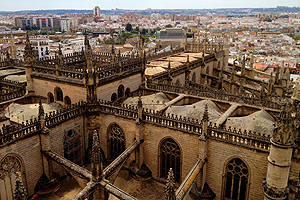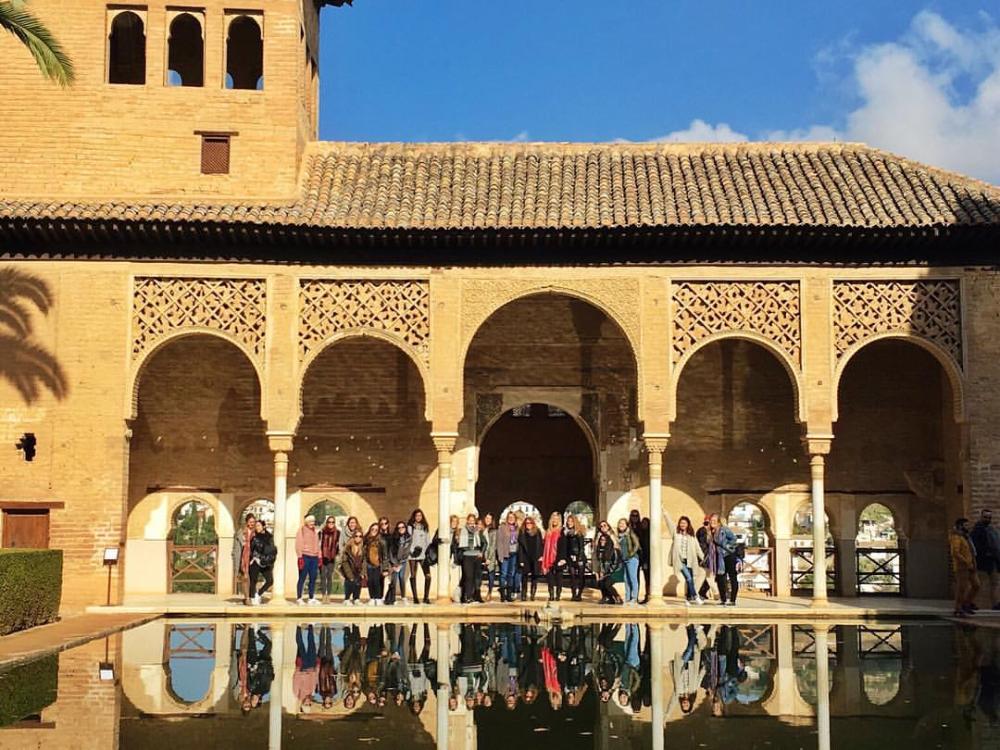
Is this program right for you?
This program is perfect for students interested in global and public health issues. It is ideal for:
- SIS students in the thematic area of Environmental Sustainability and Global Health (ESGH)
- CAS students in Public Health.
Connect with Spain!
AU students are lucky to live in the DC area near the
Spanish Embassy and DC Consulate. The Embassy and Consulate is located near George Washington University in the Foggy Bottom neighborhood of DC. There is also a cultural center near 16th and Fuller St., NW where many events are held. The Embassy often holds events related to Spanish culture that will be of great interest to AU students before and after a study abroad semester in Spain.
SPAIN Arts & Culture is another great site that features events and exhibits of the most cutting-edge works of international renowned Spanish artists in fields such as design, urban culture, architecture, visual arts, film, performing arts, literature and music. Take advantage of your DC location by participating in events and soaking up some Spanish culture stateside!
Academics
Students will take courses at the
AU Center in Madrid. A core course on
Comparative Health Systems in Spain and Europe (3 credits) taught in English is required, as is a course on
Spanish Language for the Health/Medical Professions. Students with advanced Spanish language skills also have the option of doing an internship at a global or public health related organization in Madrid (3 credits). The rest of the courses are chosen from an extensive list of courses on offer at the AU Center in Madrid.
Courses:
- Core Course (Required): Comparative Health Systems in Spain and Europe; SISA-353; 3 credits; This course analyzes the health structures, coverages, and successes in Spain and other European nations. Students learn about the diverse ways national health is managed, explore the impacts of a failing health system, and develop skills to understand and analyze varied state approaches.
- Core Course (Required): Spanish Language for the Health and Medical Professions; SPAN-396; 3 credits; This course covers the basics of medical field Spanish including conversational and medical vocabulary with a focus on public health. Students learn through listening, reading, writing, and speaking and apply their knowledge in real-life situations. To take this course students should have taken the beginner levels of Spanish already back at AU. Students who don't have any Spanish background will take a regular Beginner Spanish course instead.
-
Core Course: Global/Public Health Internship; SABD-391; 3 credits (internships are typically conducted in Spanish. In order for students to be allowed to complete an internship, students must have completed at least SPAN 153 (Beginning Spanish II or the equivalent) prior to arrival in Spain. Although this program does not have a language requirement, students will have a much better selection of internship opportunities if they have an intermediate to advanced level of Spanish.
- Students choose additional courses to fill out their schedule based on their interests and academic needs. Courses in the Fall at the AU Center include:
- Spanish language (courses at a variety of levels) SPAN-xxx
- Immigrant Experience in Spain/Latin America; SISA-363
- Contemporary Mediterranean Cultures (conducted in Spanish); SISA-363
- Mediterranean Politics; SISA-383
- Mediterranean Art History; ARTH-255; Can count as General Education Foundational Area 1!
- Mediterranean Cinema; LIT-379
- Interpersonal Communication Skills To Succeed In The Digital Era; COMM-351
- Journalism Abroad: Production as a Foreign Correspondent (conducted in Spanish); COMM-251
- Spain's Soccer Obsession: Managing and Marketing Soccer Clubs in Spain; KSB-350
- Independent Study (variety of disciplines - student will work with AU Center Director to identify a project of interest to the student); SABD-490?
Students may choose additional courses at the Transforming Arts Institute (classes conducted in Spanish); ABRD-305
Student Life

Only in Madrid can you stroll through the lovely Retiro Park and enjoy the jugglers and mimes, treat yourself to
tapas while taking in the exquisite design of the old Plaza Mayor, or view the paintings of Goya, Velasquez, and El Greco at the Prado Museum. Also, Madrid's fabulous public transportation system makes conquering this exciting city easy!
Madrid truly lives up to its title as a city that never sleeps. Night-owls delight in Madrid as you are expected to eat and dance the night away, whether you're twenty years old or fifty years old. There is always
something to do in Madrid no matter what time it is.
Housing & Meals
Full language integration happens in the home, as well as the classroom. During your participation in the Global & Public Health Issues Program, you live in a Spanish home. Your homestay allows you to experience the warmth and hospitality of Spain while improving your language skills. In the homestay, students have their own room in a Spanish homestay and enjoy breakfast, evening meals, and weekly laundry. Students commute approximately 30 min from their homestay to the AU program office in the center of Madrid. During program excursions, students stay in hotels.
Students enjoy all daily meals with their host families in Madrid. One meal a day is usually included in the program during the study trips.
Study Excursions

The program incorporates academic field trips to several important Mediterranean sites into the academic program. These site visits are most strongly incorporated into the required core comparative health systems course, but several other courses draw on the information presented during these visits as part of the course material. Past destinations in the Fall have included various cities in Spain, Italy, Greece and Morocco!
Visa Information
Upon acceptance, AU Abroad staff will provide students with a letter to obtain their Student Visa. Students are responsible for contacting the Spanish Embassy or Consulate to find out which additional documents are needed to obtain a student visa. Any visa requirements for program excursions are handled by on-site staff. Non-US citizens are encouraged to check with all relevant embassies to be aware of any special circumstances or requirements.
Often student visa applications will not be accepted more than 90 days in advance or less than 45 business days prior to departure date, passports must be left at the Consulate General for processing. It may take four to six weeks to process your application.
